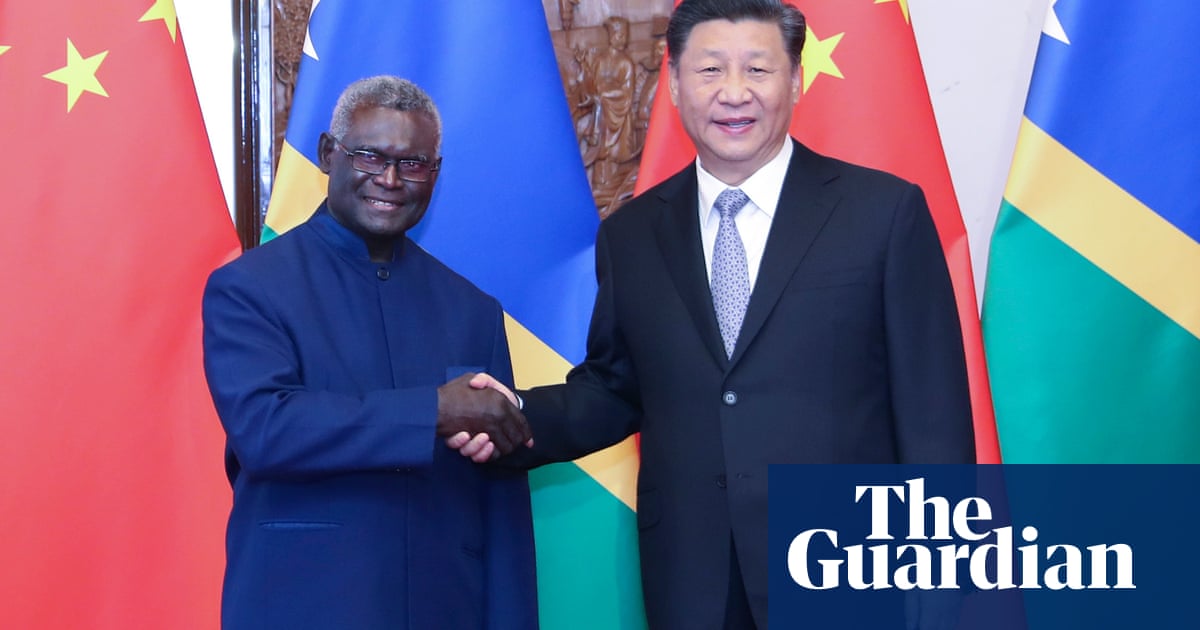Solomon Islands politicians allege both China and Taiwan offered bribes of hundreds of thousands of dollars to gain their support during a diplomatic row that rocked the country earlier this year.
In September the prime minister of the Solomon Islands, Manasseh Sogavare, formally severed ties with Taipei and established relations with Beijing, ending the country’s 36-year relationship with Taiwan.
The decision had reverberations around the world, incensing US senators, outraging the Taiwanese, influencing Kiribati to also abandon Taiwan less than two weeks later, and causing headaches for Australia at a time when Beijing’s influence in the Pacific appears to be expanding. Now, just 15 countries recognise Taiwan.
As part of an investigation of the inside story behind the diplomatic switch, the Guardian can reveal that MPs allege they were approached by representatives from the Chinese and Taiwanese governments and offered hundreds of thousands of dollars in exchange for their support.
The deputy leader of the opposition, Peter Kenilorea Jr, told the Guardian that it was “an open secret that money is always involved in these things”, referring to MPs abandoning long-held pro-Taiwan positions to support Beijing.
Kenilorea, who opposed the switch and labelled it a “slap in the face of the parliamentary process”, said he heard from MPs that were involved in the decision that they had been offered between SBD$2m-$5m ($246,000-$615,000) to support Beijing.
Daniel Sudaini, the premier of Malaita, Solomon Islands’ largest province, alleges he was offered a bribe in exchange for softening his strong anti-Beijing position.
“Before the switch was made… there is a group of people or maybe someone who called me on the phone to give me an offer so I can support the switch. But I decided not to because if I accept the offer I’m not representing the people.
“They were offering an amount of money, telling me on the phone if you join us there’s a package here.”
Sudaini, who said he rejected the offer, previously told the Solomon Star the bribe he was offered was SBD$1m ($123,000). His accusation is now the subject of a formal inquiry by the Solomon Islands’ police commissioner.
In a statement, China’s foreign ministry said the establishment of diplomatic ties with the Solomon Islands had been an “open and above board” process.
“No rumour or slander will affect the development of friendly relations between China and the Solomon Islands,” it said.
Titus Fika, a government MP who chaired one inquiry that ended up recommending the government change its allegiance from Taiwan to China, denied that money influenced the decision of his committee. Instead, Fika accused Taiwan of trying to corrupt the process, saying he was offered a bribe from Taiwan to keep the status quo.
“Taiwan wanted to bribe [me]. They wanted to give us $1m to sign for Taiwan then after we sign for Taiwan we will receive another [$1m] into our account,” he said.
“But it doesn’t work, because we don’t sign for it, because we want to do the right thing, not to for our own interest but for the country’s interest and our constituency interests.”
In a statement to the Guardian, Taiwan rejected the accusations. “Under no circumstances will Taiwan resort to an ugly dollar diplomacy bidding war with China, much less line the pockets of corrupt politicians,” said Joanne Ou, a spokesperson for the ministry of foreign affairs.
A 2017 report by Transparency International found the Solomon Islands to be “very corrupt” and said the situation “appears to be deteriorating”.
Sogavare’s office declined multiple interview requests by the Guardian.

